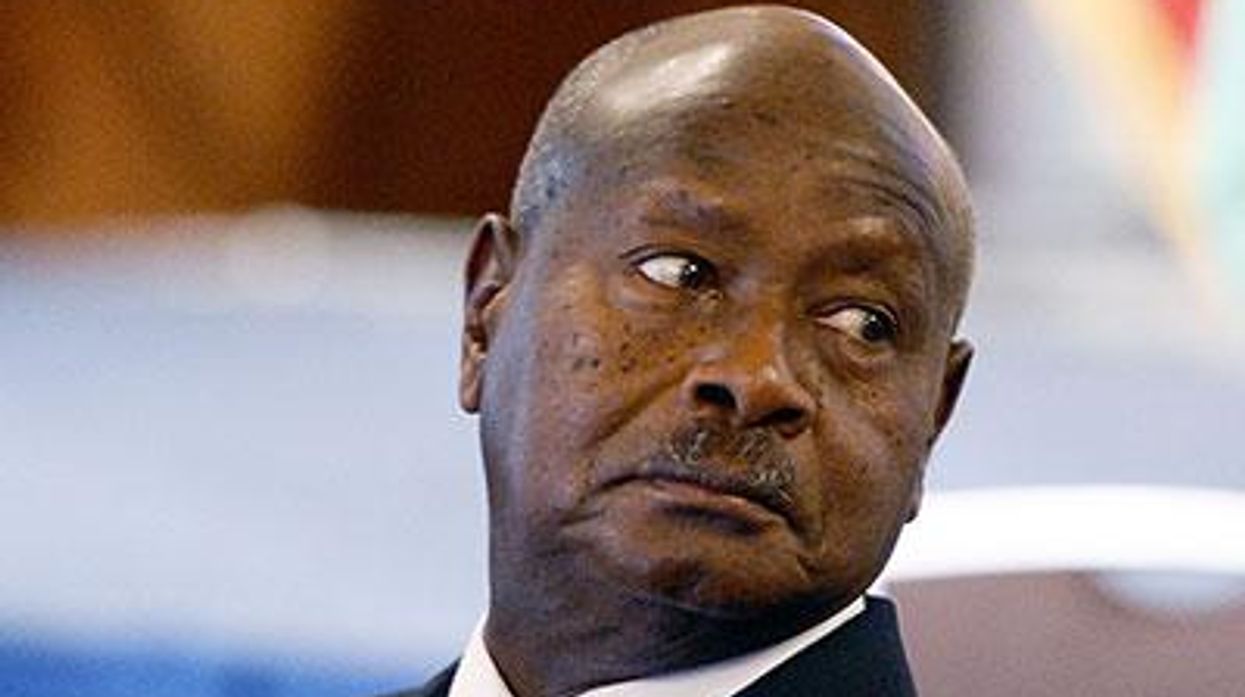In the wake of Uganda's Constitutional Court striking down the draconian Anti-Homosexuality Act on a procedural technicality, speculation about if, when, and how the legislation will reemerge has run the gamut from "not any time soon," to "very soon, but without penalties for consenting adults," according to mulitple media reports.
Yet for watchers of politics in Kampala, Uganda's capital, the only opinion that matters is that of longtime Ugandan president-cum-dictator Gen. Yoweri Museveni. According to the Associated Press, Museveni recently told members of his National Resistance Movement party "not to cause chaos" by hastily introducing a new antigay law.
The AP headlined its story, "Uganda President Not Keen on Rushing Anti-gay Law."
Museveni has called for a panel of "experts," chaired by Vice President Edward Kiwanuka Ssekandi, to examine assertions that the Anti-Homosexuality Act violated the basic human rights of LGBT Ugandans, notes the AP. The LGBT and allied Ugandans who brought the constitutional challenge did not have the opportunity to advance those constitutional claims in court because the judges struck down the law according to the lack of a quorum in Parliament when the bill was passed, leaving the possibility open for a new, similar law to be put in place.
Museveni reportedly told his fellow party members that "the law was not a priority for the country's development even as there was need to protect the family institution," according to a news article published earlier this week by the government-controlled New Vision newspaper.
"A country which has no vision punishes a divided house," the paper reported Museveni saying in response to a majority of Ugandan parliamentarians who have expressed a desire to quickly reintroduce antigay legislation. "We need to work together through consensus and use of collective methods."
One antigay member of parliament told the AP that he has already gathered more than 200 signatures from lawmakers who he claims are ready to support new anti-LGBT legislation.
And while the AP and government-run Uganda newspaper contend that Museveni is reluctant to replace the defunct legislation, Al Jazeera recently ran a contradictory report headlined, "Uganda Seeks to Reinstate Antigay Bill."
Leading NMR politico and high-ranking member of Parliament Medard Bitekyerezo, a staunch supporter of the now-defunct law, gave Al Jazeera a statement as cryptic as that given by his party's leader.
"[The president] said he wants the law back in the house but now says if two consenting adults go into their room and decide to be stupid, let them be," Bitekyerezo told Al Jazeera. "What he said he doesn't want, and which we must even increase the penalties [for], is recruitment of children and exploiting financially vulnerable youths."
Echoing that sentiment, Bitekyerezo told the AP, "The law may come back with some small modifications, but I can tell you that it will come back."
Although technically in force for just six months, the Anti-Homosexuality Act wrecked havoc on LGBT Ugandans. During that time, LGBT activists in Uganda reported a tenfold increase in the amount of violence, harassment, and discrimination faced by those perceived to be LGBT. Citing the law's prohibition on the "promoting homosexuality," American- and university-backed HIV prevention and male rape victim assistance programs were raided, students and clinicians working with those groups were arrested or required to hand over the names of their patients, and hundreds of LGBT Ugandans fled to neighboring countries, including Kenya.
Although the law's provision imposing lifelong prison sentences on those convicted of "aggravated homosexuality" is no longer enforceable, homosexuality remains illegal in the east African nation under a colonial-era law prohibiting "sex acts against the order of nature," reports the AP.




































































Charlie Kirk DID say stoning gay people was the 'perfect law' — and these other heinous quotes